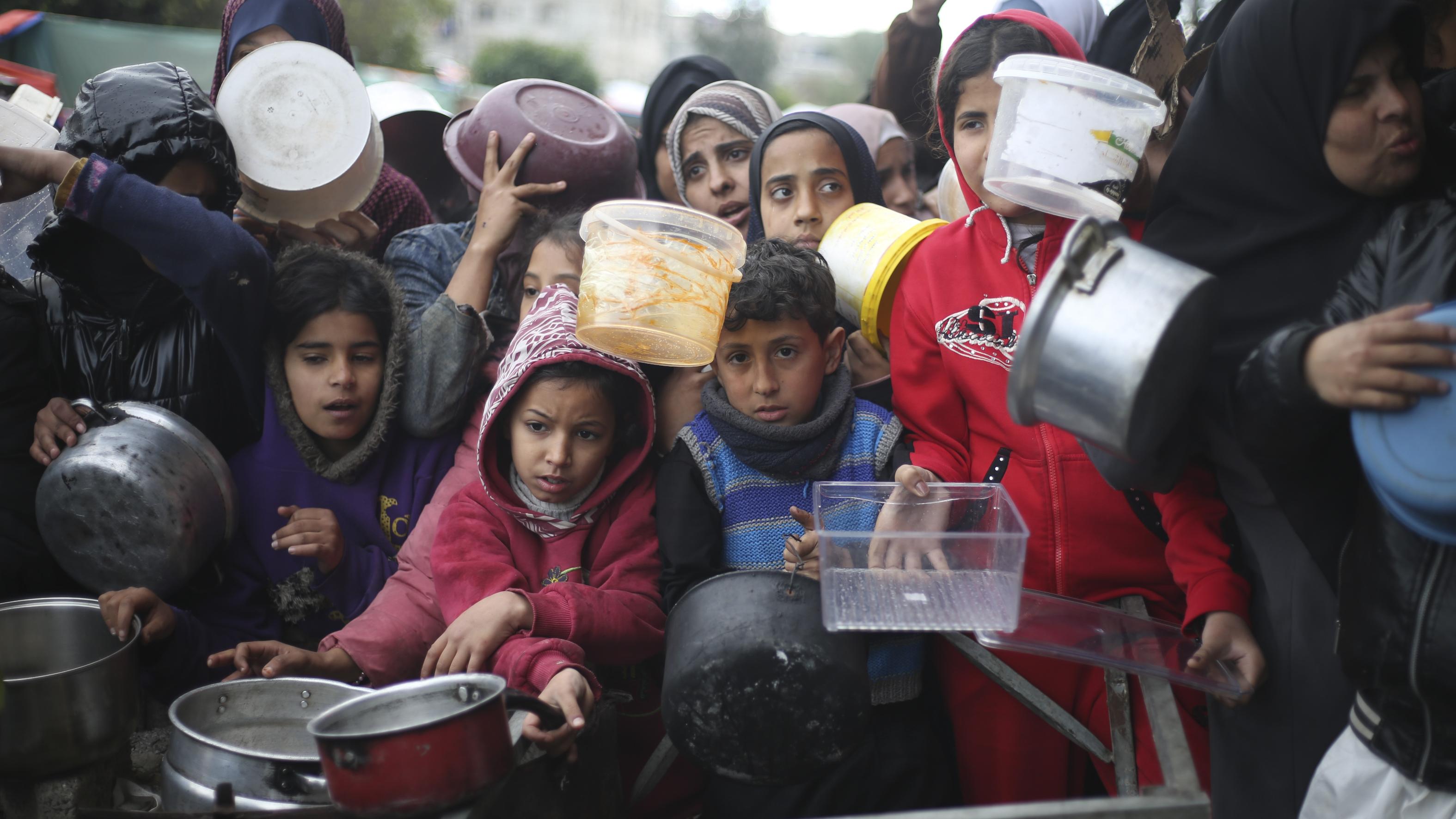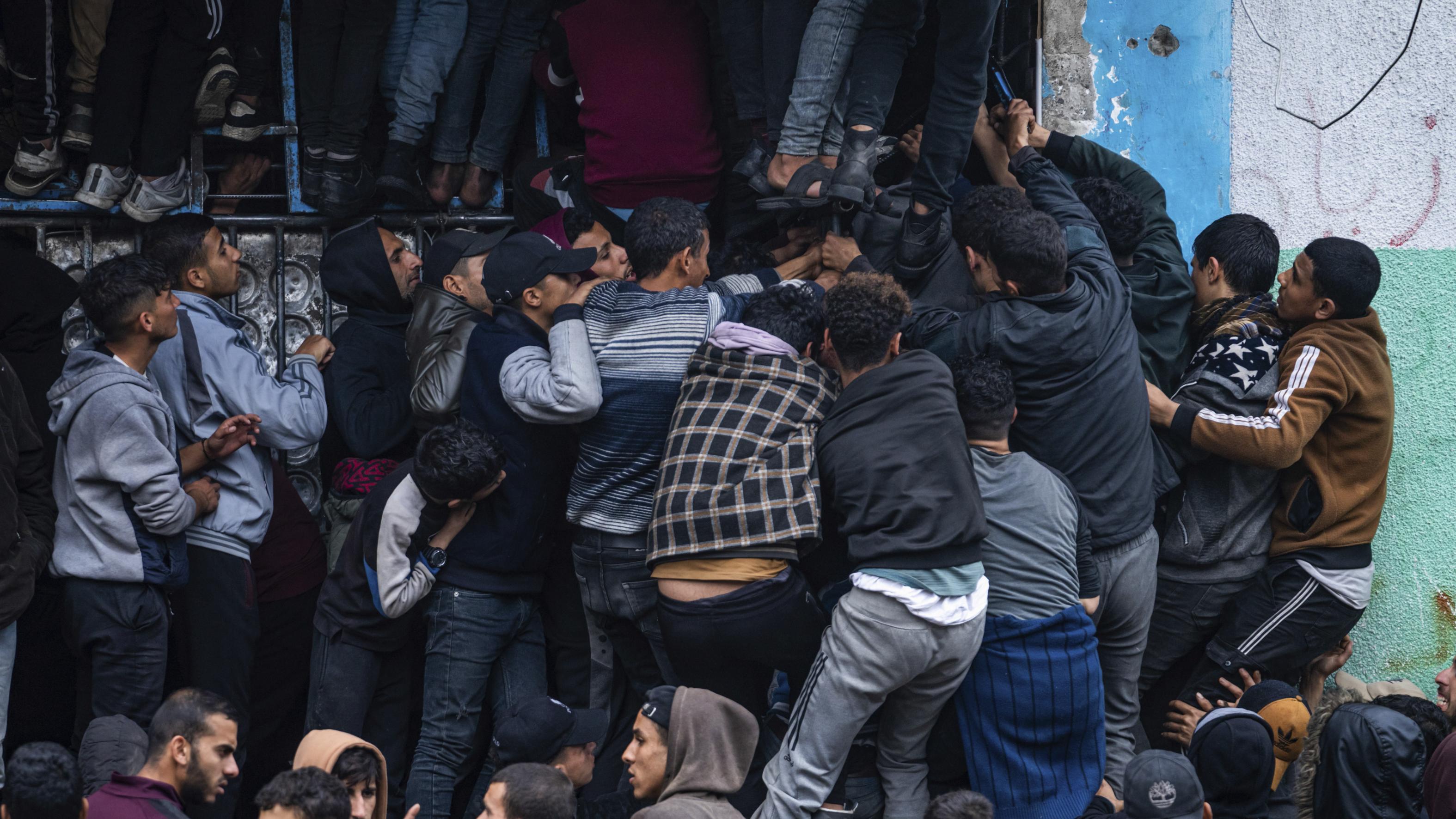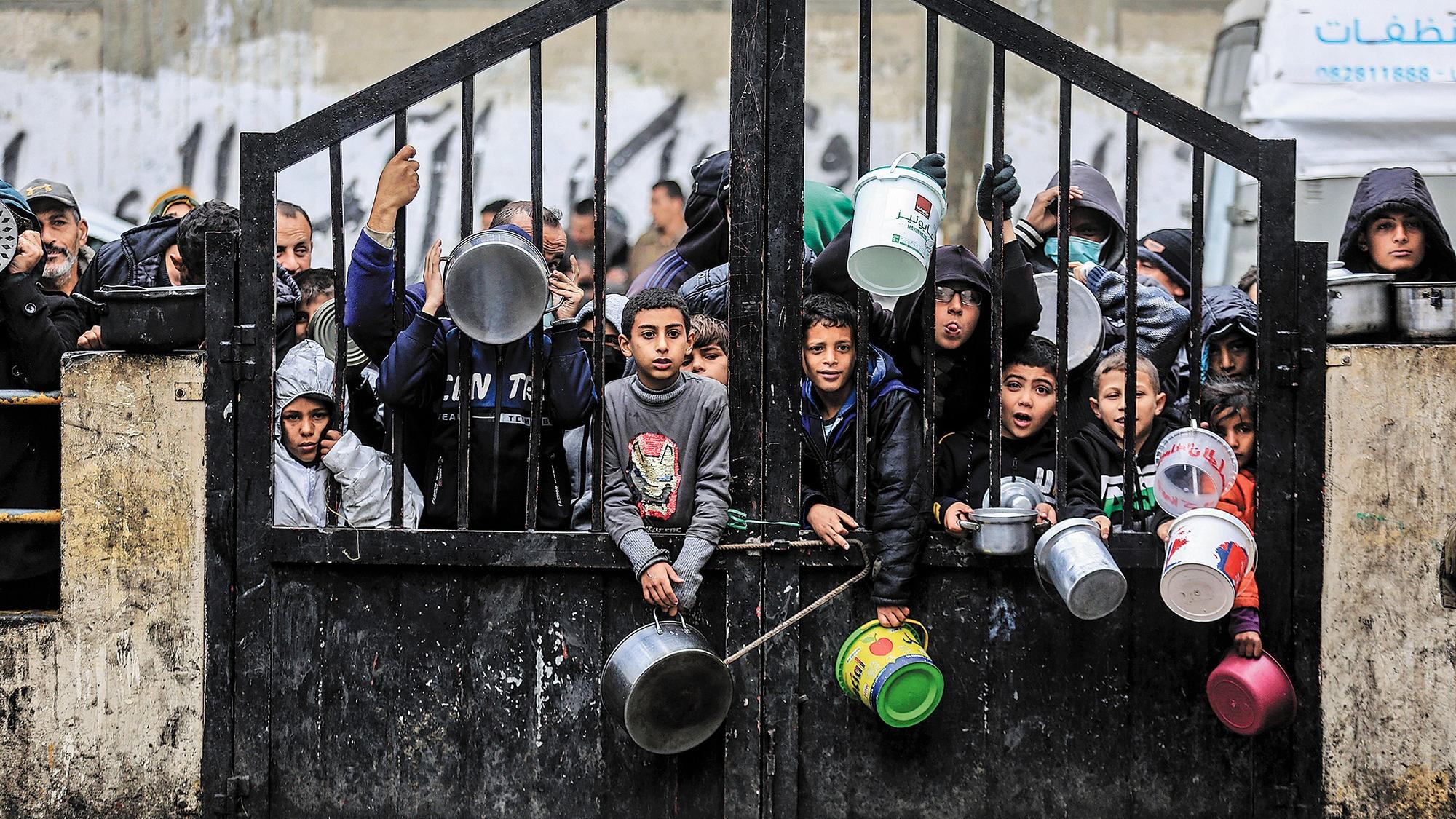 Palestinians line up for free food distribution during the ongoing Israeli air and ground offensive in Khan Younis, Gaza Strip, Feb 2, 2024. (PHOTO / AP)
Palestinians line up for free food distribution during the ongoing Israeli air and ground offensive in Khan Younis, Gaza Strip, Feb 2, 2024. (PHOTO / AP)
Analysts welcome potential cease-fire to allow food aid into embattled enclave as crisis worsens
Reports of a possible temporary cease-fire deal in the Israel-Palestine conflict have been welcomed by analysts as they noted that starvation is taking a toll on civilian lives amid an ongoing food crisis in Gaza.
United Nations Relief and Works Agency for Palestine Refugees in the Near East Commissioner-General Philippe Lazzarini lamented that the last time the organization was able to deliver food aid to northern Gaza was on Jan 23, adding that their calls to send food aid “have been denied and have fallen on deaf ears”.
“This is a man-made disaster. The world committed to never let famine happen again. Famine can still be avoided, through genuine political will to grant access and protection to meaningful assistance. The days to come will once again test our common humanity and values,” Lazzarini wrote on X, formerly Twitter, on Feb 26.
On Feb 19, UNICEF, the World Health Organization, and the World Food Programme issued a consolidated statement, noting that before the ongoing hostilities, malnutrition was rare in Gaza with just 0.8 percent of children under 5 classified as acutely malnourished
Doha-based news outlet Al Jazeera reported on Feb 25 that a two-month-old Palestinian boy died from starvation in northern Gaza, just days after international child welfare advocates warned of an “explosion” in child deaths due to Israel’s attacks on the besieged enclave.
ALSO READ: Health ministry: Palestinian death toll in Gaza rises to 29,692
On Feb 19, UNICEF, the World Health Organization, and the World Food Programme issued a consolidated statement, noting that before the ongoing hostilities, malnutrition was rare in Gaza with just 0.8 percent of children under 5 classified as acutely malnourished.
Acute malnutrition now affecting 15.6 percent of children under 2 in Northern Gaza suggests “a serious and rapid decline”.
Ninety percent of children under 2 and 95 percent of pregnant and breastfeeding women face severe food poverty — meaning they have consumed two or fewer food groups in the previous day — and the food they do have access to is of the lowest nutritional value.
Islamic Relief Worldwide — a faith-inspired humanitarian and development agency — noted on Jan 9 that Gaza “is suffering the world’s worst current hunger crisis”. It described it as “an entirely man-made catastrophe” resulting from Israel’s ongoing attacks and siege of the territory that is starving civilians.
 Palestinian crowds struggle to buy bread from a bakery in Rafah, Gaza Strip, Feb 18, 2024. (PHOTO / AP)
Palestinian crowds struggle to buy bread from a bakery in Rafah, Gaza Strip, Feb 18, 2024. (PHOTO / AP)
The Integrated Food Security Phase Classification (IPC) has stated that more than 80 percent of people currently classified as undergoing famine worldwide are in Gaza.
The IPC defines famine as an “extreme deprivation of food”. Starvation, death, destitution, and extremely critical levels of acute malnutrition are or will likely be evident.
The Phase 5 — famine or catastrophe — classification attributed to Gaza is the highest level on the IPC’s Acute Food Insecurity scale.
It is used when an area has at least 20 percent of households facing an extreme lack of food, at least 30 percent of children suffering from acute malnutrition, and more than two people in every 10,000 are dying each day due to outright starvation or the interaction of malnutrition and disease.
READ MORE: Israel to send delegation to Qatar to continue Gaza truce talks
“The deliberate starvation, particularly evident in the northern part of Gaza, is viewed as a coercive tactic aimed at compelling Palestinian resistance factions to acquiesce to Israeli terms,” Belal Alakhras, a political analyst and Palestinian researcher at the University of Malaya in Malaysia, told China Daily.
“Amid this critical juncture in Gaza with far-reaching regional implications, the role of international actors comes under scrutiny, serving as a litmus test of whether the global landscape remains predominantly under the sway of US unipolarity or has indeed transitioned to a multipolar reality,” he added.
Negotiations on hammering out an urgent cease-fire deal took place in Paris among representatives from Egypt, Qatar, the United States, and Israel on Feb 23.
Conditions on a potential six-week pause involve a prisoner swap deal between the Palestinian Islamic Resistance Movement (Hamas) and Israeli authorities, various media reported.
 Displaced Palestinian children gather to receive food at a government school in Rafah in the southern Gaza Strip on February 19, 2024, amid the ongoing battles between Israel and the militant group Hamas. (PHOTO / AFP)
Displaced Palestinian children gather to receive food at a government school in Rafah in the southern Gaza Strip on February 19, 2024, amid the ongoing battles between Israel and the militant group Hamas. (PHOTO / AFP)
The talks were set to resume in Qatar where an Israeli delegation was expected to arrive to continue securing a pause in the conflict in Gaza that may see its hostages being released.
Israeli Prime Minister Benjamin Netanyahu told US broadcaster CBS News it was unclear whether a hostage deal would materialize from the negotiations but said Hamas needed to make more reasonable demands as he accused them of being on “another planet”.
On Feb 26, Palestinian Authority's Prime Minister Mohammad Shtayyeh tendered his resignation to President Mahmoud Abbas, according to a report by WAFA News Agency.
The Prime Minister explained at the weekly cabinet session held in Ramallah that the decision “comes in light of the political, security, and economic developments related to the aggression against Palestinian people in the Gaza Strip, and the unprecedented escalation in the West Bank, including the city of Jerusalem.”
READ MORE: Palestine rejects Israeli PM's post-war plan for Gaza
It is not sure how this latest move will impact the PA’s negotiations with other players in multiple fronts.
Meanwhile, Qatar's Emir Sheikh Tamim bin Hamad Al-Thani, whose country has been involved in mediation efforts, is scheduled to visit Paris for his first state visit to France since becoming emir in 2013. Gaza is expected to be a central focus on the agenda in his talks with French President Emmanuel Macron.
Alakhras from the University of Malaya noted that almost five months into the conflict, Israel had yet to achieve its stated military objectives.
This dilemma, he said, “has not gone unnoticed by Israel’s allies”, who are now exploring alternative approaches to safeguard Israeli interests “amid this quagmire”.
“Discussions of a potential pause or cease-fire in Gaza reflect a maneuver to secure the release of Israeli prisoners in exchange for Palestinian detainees, affording Israel the opportunity to reassess its approach to the situation,” said Alakhras.
 Displaced Palestinians wait to collect free food on Jan 27, 2024 in Rafah, southern Gaza. Twenty Palestinians were killed and 150 injured in Israeli air strikes in Gaza as they queued up to collect food aid, a spokesperson for Gaza’s Hamas-run health ministry said that day. The Israeli military said it was looking into the report. (PHOTO / AP)
Displaced Palestinians wait to collect free food on Jan 27, 2024 in Rafah, southern Gaza. Twenty Palestinians were killed and 150 injured in Israeli air strikes in Gaza as they queued up to collect food aid, a spokesperson for Gaza’s Hamas-run health ministry said that day. The Israeli military said it was looking into the report. (PHOTO / AP)
“In contrast, Palestinians are seeking a cessation of hostilities to stop the ongoing bloodshed, which is mostly felt by civilians.
“Israel and its allies, particularly the United States, appear inclined to perpetuate this cycle, seeking to evade the implications of the October moment, which also poses a threat to the political standing of the current Israeli government and regional leverage for them,” he added.


